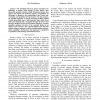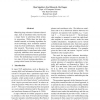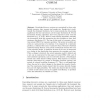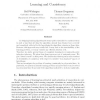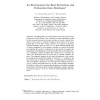130
click to vote
DMIN
2008
15 years 3 months ago
2008
The knowledge discovery process encounters the difficulties to analyze large amount of data. Indeed, some theoretical problems related to high dimensional spaces then appear and de...
108
click to vote
ALENEX
2008
15 years 3 months ago
2008
The multi-period newsvendor problem describes the dilemma of a newspaper salesman--how many paper should he purchase each day to resell, when he doesn't know the demand? We d...
120
click to vote
ACL
2007
15 years 3 months ago
2007
Obtaining large volumes of inference knowledge, such as entailment rules, has become a major factor in achieving robust semantic processing. While there has been substantial resea...
152
click to vote
ETVC
2008
15 years 3 months ago
2008
In a seminal paper, Amari (1998) proved that learning can be made more efficient when one uses the intrinsic Riemannian structure of the algorithms' spaces of parameters to po...
143
click to vote
DIS
2006
Springer
15 years 4 months ago
2006
Springer
Knowledge discovery systems are constrained by three main limited resources: time, memory and sample size. Sample size is traditionally the dominant limitation, but in many present...
119
click to vote
GOSLER
1995
15 years 5 months ago
1995
In designing learning algorithms it seems quite reasonable to construct them in such a way that all data the algorithm already has obtained are correctly and completely reflected...
SBIA
2000
Springer
15 years 5 months ago
2000
Springer
Abstract Classi
118
Voted
ICALP
1998
Springer
15 years 5 months ago
1998
Springer
An architecture is described for designing systems that acquire and manipulate large amounts of unsystematized, or so-called commonsense, knowledge. Its aim is to exploit to the fu...
136
click to vote
ENC
2004
IEEE
15 years 5 months ago
2004
IEEE
A method to induce bayesian networks from data to overcome some limitations of other learning algorithms is proposed. One of the main features of this method is a metric to evalua...
CAV
2010
Springer
15 years 6 months ago
2010
Springer
d Abstract) Benedikt Bollig1 , Joost-Pieter Katoen2 , Carsten Kern2 , Martin Leucker3 , Daniel Neider2 , and David R. Piegdon2 1 LSV, ENS Cachan, CNRS, 2 RWTH Aachen University, 3 ...
